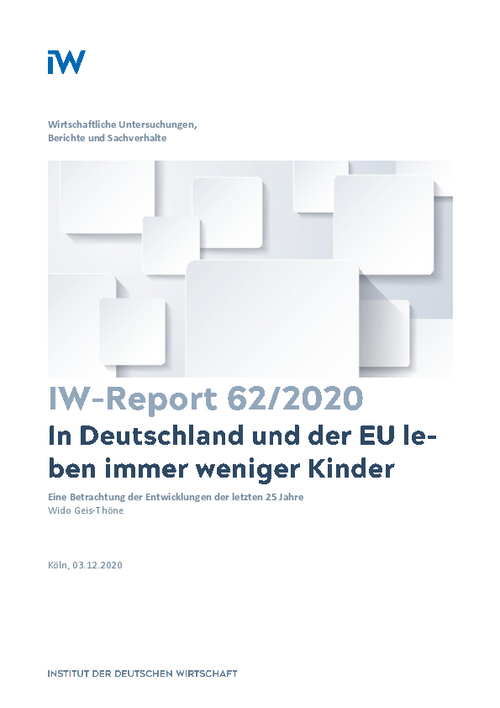In the 25 years between 1994 and 2019, the number of minors in Germany fell by 14.2 percent and in the EU-27 (excluding the United Kingdom) by 15.1 percent. However, the trends were very different.

Fewer and Fewer Children Live in Germany and the EU
IW-Report

In the 25 years between 1994 and 2019, the number of minors in Germany fell by 14.2 percent and in the EU-27 (excluding the United Kingdom) by 15.1 percent. However, the trends were very different.
In Germany, the figures reached a low point in 2015 and since have risen again, whereas the numbers for the EU as a whole have continued to fall. Moreover, there are major differences between young children under the age of six, older children between six and eleven and juveniles between twelve and seventeen. The number of juveniles has fallen particularly sharply in the new EU member states. However, because of the high former level here, their share on the population in 2019 was with 6.0 percent still higher than in Germany with 5.4 percent. In Germany, the situation is also very unfavourable with respect to the older children, who make up 5.3 percent of the population. In contrast, with respect to the younger children, the country is with 5.6 percent close to the EU average of 5.8 percent and far above the value of Southern Europe of only 5.0 percent. The decisive factor for this better positioning is the increase in the birth rate in the years between 2008 and 2016, which, however, has not continued since then. For policymakers, the falling numbers of children mean that they must prepare for the fact that relatively few people will enter the workforce in the next years, and that they should make targeted provisions, including appropriate adjustments to the social security system and a promotion of immigration.

Wido Geis-Thöne: In Deutschland und der EU leben immer weniger Kinder – Eine Betrachtung der Entwicklungen der letzten 25 Jahre
IW-Report

More on the topic
![[Translate to English:] Das Gebäude des Weißen Hauses in Washington, D.C. in den Vereinigten Staaten von Amerika. [Translate to English:] Das Gebäude des Weißen Hauses in Washington, D.C. in den Vereinigten Staaten von Amerika.](/fileadmin/_processed_/c/1/csm_GettyImages-2161499385_White_House_Editorial_884306add8.jpg)
Trump or Harris or ...? What Europe must prepare for
A few months before the presidential election in the USA, Donald Trump has a good chance of being re-elected. On the Democratic side, the incumbent president has withdrawn his candidacy after a long period of hesitation, while Vice President Kamala Harris is ...
IW
Compendium 5.5: CO2 Regulation of Road Transport in Europe
With the Compendium CO2 Regulation in Europe, the IW has been providing the interested public with a comprehensive collection of data on the development of CO2 emissions from passenger car traffic in the European Union, as well as on the applicable regulatory ...
IW